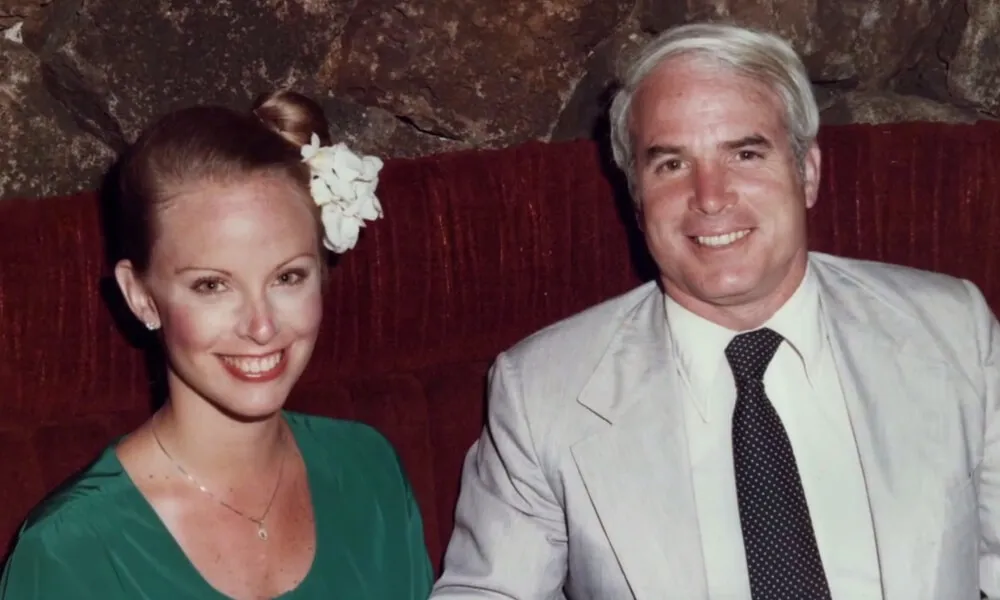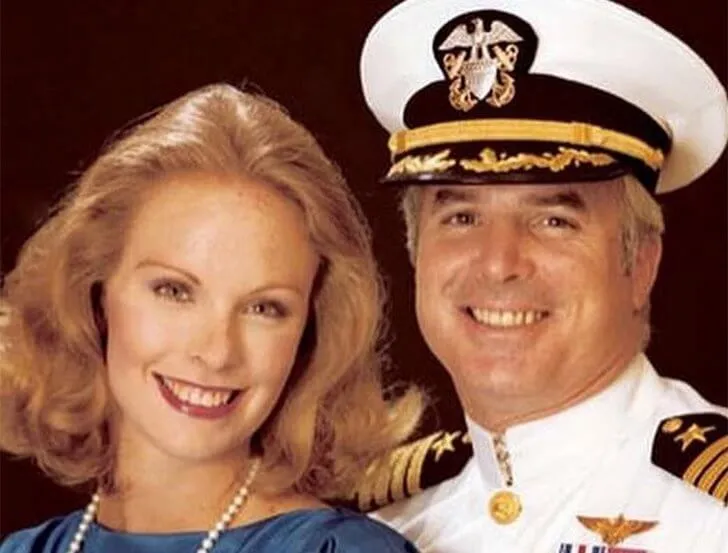John McCain: A Lifetime of Public Service
Senator John McCain might as well be the poster child American citizen. Prevailing as a POW in Vietnam, he returned to the United States ready to take on a new challenge: politics. His political career would culminate in his 2008 run for the presidency, but nothing would shock the nation quite as much as what he did in the Senate following his brain cancer diagnosis in 2017.
His Future Was Predetermined By His Father And Grandfather

John Sidney McCain III was born August 29, 1936, in the Panama Canal Zone. At the time of his birth his father, John S. McCain Jr., was stationed at a submarine facility at the Coco Solo Naval Air Station, where his grandfather, John "Slew" McCain, was a base commander.
Both McCain's father and grandfather became four-star U.S. Navy admirals within their military careers, setting a precedent and high expectations for the third John S. McCain to live up to.
"All My Life I Knew I Was Going To The Naval Academy"

McCain cultivated a rebellious reputation while attending Episcopal High School, a boarding school in Virginia. He was called "McNasty" after defying school dress code by wearing unwashed jeans and shoes held together with tape. He was a "tough guy" boxer who was often at odds with authority, which is why his friends were surprised to learn that he was attending the U.S. Naval Academy.
"From my earliest age I remember people saying, 'He's going to be at the Naval Academy like his father and grandfather.' It was just something that was going to happen. And perhaps that's why I practiced this rebellion against the system, always walking the edge," he told Robert Timberg, author of An American Odyssey.
McCain Essentially Floated Through The Naval Academy

Although McCain made it into the U.S. Naval Academy of his own accord by acing the entrance exam, his pedigree was already a surefire ticket into the Annapolis institution thanks to his father and grandfather. Despite the reputation associated with his name, McCain found himself with plenty of demerits for his unwillingness to abide by the rigid rules of the Academy.
His rebelliousness was coupled with lackluster grades as well. Although he had a high IQ and good grades in subjects like history and English, he only did "good enough" for subjects that he had no interest in, like math. He graduated in 1958 with the fifth lowest rank in his class of almost 900.
A Party Man Throughout Flight School

McCain was commissioned an ensign after graduating from the Naval Academy and subsequently entered flight school. He began his naval aviator training in 1959 in Pensacola, Florida before moving to Corpus Christi, Texas, where he was eventually promoted to lieutenant, junior grade before graduating in 1960.
Over the course of his two years in flight school, he had the reputation of a party man and he wasn't the greatest pilot either, as he allegedly didn't take the time to thoroughly study his aviation manuals. In 1965, McCain married his first wife Carol Shepp and adopted her two sons, Douglas and Andrew. By 1966, McCain's first daughter Sidney was born.
McCain Was A Serious Aviator During The Vietnam War

By 1967, McCain was promoted to lieutenant commander and joined the aircraft carrier USS Forrestal on its way to fight the Vietnam War. Upon arrival, he joined Operation Rolling Thunder, an air interdiction and strategic bombing campaign against Northern Vietnam.
Three crashes in his early flying career led Navy officials to question McCain's abilities in the cockpit, but his work in Vietnam earned him the reputation of a "serious aviator." However, on his 23rd mission, the wing of his plane was shot with a Vietnamese missile, plummeting McCain into the Trúc Bach Lake.
How McCain Became A Prisoner Of War

McCain suffered fractures in both his arms and his right leg. Upon landing in the lake, he was seized by a mob of Vietnamese who pulled him ashore and immediately began torturing him, crushing his shoulder with a rifle but and bayonetting his foot and abdominal area. He was taken to the Hỏa Lò Prison, which would later become known to American POWs as the "Hanoi Hilton."
Although he was in dire physical condition, the Vietnamese captors refused to give him medical treatment unless he provided military information. McCain would only give them his name, rank, serial number, and birthdate.
The Vietnamese Dubbed Him A Crown Prince

McCain offered the Vietnamese more information on the condition that they take him to a hospital, but instead, a prison doctor examined him only to determine that McCain was near death. It wasn't until the Vietnamese found out that McCain was the son of a high-ranking Navy Admiral that they decided to give him medical treatment and afterward they referred to him as "the crown prince."
Although now in the care of a hospital, McCain was still subject to violent interrogations. He ended up revealing the names of his ship, squadron, and the intended targets. He later regretted violating the Code of Conduct, but he didn't think the information he divulged was useful.
He Was Sent To "The Plantation"

He spent just over a month in a hospital in unsanitary and dangerous conditions. The medical attention McCain was given was meager and his injuries were not properly cared for. In 1967, he was sent to a prisoner-of-war camp called "the Plantation," located in the outskirts of Hanoi.
There, he was placed in a cell with two Air Force pilots named George Day and Norris Overly, who would later say they didn't expect McCain to survive a week. Still, they worked together to keep McCain alive. At this point he had lost 50 pounds, was in a chest cast, and his hair had turned white.
McCain Refused A Chance At Freedom
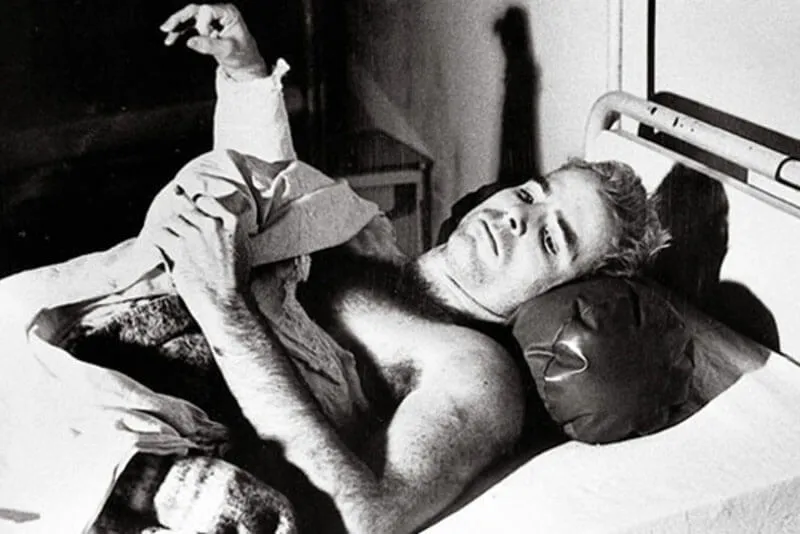
By 1968, McCain was placed in solitary confinement and coincidentally, his father was named the Commander-in-Chief, Pacific Command, thusly making him commander of all U.S. forces in the Vietnam theater. The Vietnamese offered McCain a chance to be released with the intention of using it as propaganda to appear merciful and to show other POWs that elite members were willing to be treated preferentially.
However, because the U.S. Code of Conduct implies a "first in, first out" policy for POWs, McCain refused to be released unless all POWs captured before him were released as well.
McCain Was Pushed To The Edge

For two years, McCain was subject to various torture methods, all while suffering from dysentery. The Vietnamese used ropes to bind McCain into painful positions, after which they would beat him every two hours. His previous injuries were made worse, in addition to suffering cracked ribs and teeth.
When he wasn't being beaten, McCain was left to rot in a pile of his own waste and even attempted suicide (after which he was put on suicide watch). Later in his life, McCain would write, "I had learned what we all learned over there: every man has his breaking point. I had reached mine."
The Vietnamese Forced Him To "Confess"

His breaking point came after four days of torture. McCain relented and signed a forced "confession" that said, "I am a black criminal and I have performed the deeds of an air pirate. I almost died, and the Vietnamese people saved my life, thanks to the doctors."
Throughout his written confession, McCain "deliberately [laced] the stilted statement with Communist jargon and grammar mistakes to make clear that it had been forced," the New York Times reported. From that point on, McCain was forever haunted with the feeling that he had dishonored his country.
The Aftermath Of Five Years Of Torture
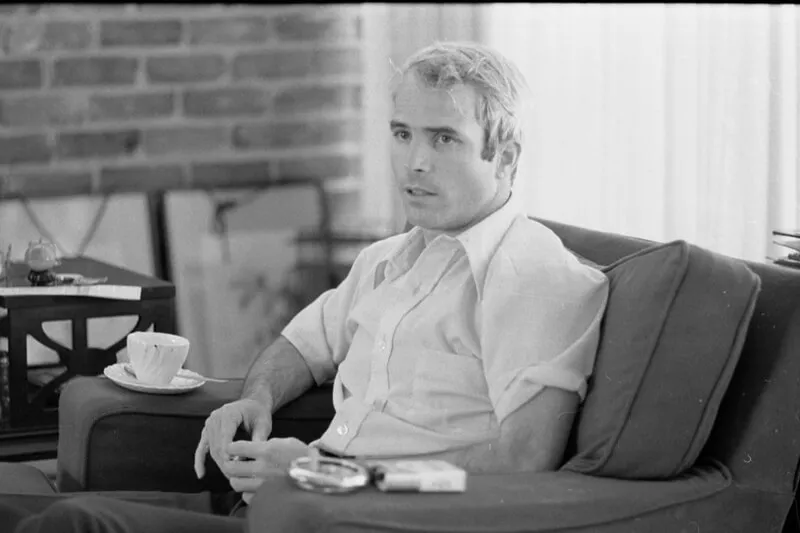
Direct U.S. involvement in the Vietnam War ended in 1973 when the Paris Peace Accords were signed and McCain was eventually released almost two months later. He had spent a total of five and a half years as a POW and suffered permanent physical damage.
For his actions, he was awarded the Silver Star Medal, the Legion of Merit, three Bronze Star Medals, the Purple Heart Medal and a Navy Commendation Medal. McCain became a public sensation upon returning to the U.S. and was a frequent guest of honor at dinners hosted by then-California-governor Ronald Reagan.
While His Work Life Flourished, His Personal Life Faltered

Promoted to commander, McCain worked hard to rehabilitate himself so that he could get his flight status reinstated, eventually getting assigned to an A-7 Corsair II training squadron in Jacksonville, Florida. But the years apart took a toll on McCain and his wife and despite being reunited, they grew apart.
His infidelity, however, played the most prominent role in their eventual divorce. In Worth the Fighting For, McCain writes, "[My] marriage's collapse was attributable to my own selfishness and immaturity more than it was to Vietnam, and I cannot escape blame by pointing a finger at the war. The blame was entirely mine."
McCain Started A New Life In Phoenix
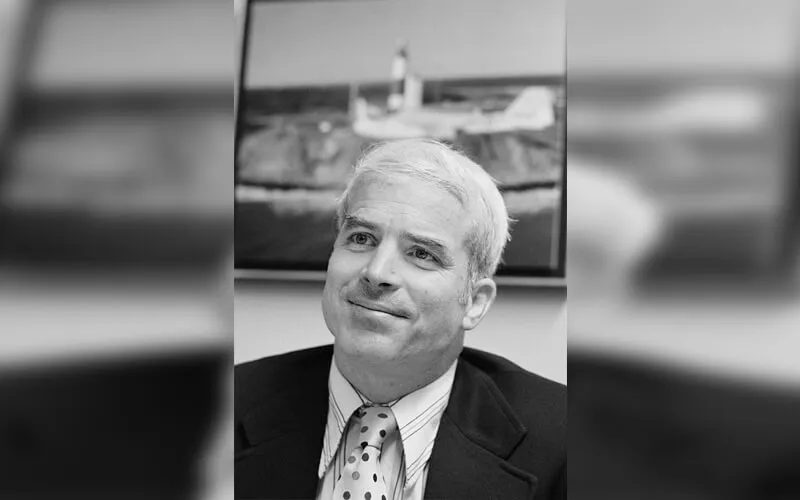
McCain cites his appointment to the Senate Liason Office at the Navy's Office of Legislative Affairs in 1977 as his "real entry into the world of politics and the beginning of [his] second career as a public servant." Two years later, McCain began an extramarital affair with Cindy Lou Hensley. He urged Carol for a divorce and by 1980 it was dissolved, with Carol receiving most, if not all, of the benefits.
McCain subsequently married Cindy in Phoenix, where he would resettle and begin his career in politics. He officially retired from the Navy in 1981, breaking the tradition of achieving four-star admiral status like his father and grandfather.
Cindy Stayed Home to Raise Their Children
Having a family was a priority for the McCains, who welcomed Meghan, John Sidney IV, and James in 1984, 1986, and 1988 respectively. But as John's political career was thriving, Cindy stepped up to take care of their children in Arizona while he worked in Washington D.C.
In Phoenix, McCain was appointed as Vice President of Public Relations at Hensley & Co., employed by his new father-in-law. This gave him the clout to run as a Republican for an open seat in Arizona's 1st congressional district in 1982 and won. By 1983, he was assigned to the House Committee on Interior Affairs and was elected to lead the incoming group of Republican representatives.
The McCain Family Grows And Adopts From Bangladesh

John and Cindy McCain's family grew again and in 1993 when they adopted a three-month-old Bangladeshi orphan who they named Bridget. According to ABC News, “Cindy visited Bangladesh and met the baby at an orphanage, who had a severe cleft palate. Cindy decided to bring the baby back to the United States, where she underwent years of surgery."
Interestingly, Cindy didn't tell John about the baby. Instead, she brought Bridget home and introduced her to her husband who instantly fell in love.
The McCains Started the McCain Institue for International Leadership
The McCains have long been known for their philanthropic efforts throughout the years. Notably, the couple founded the McCain Institute for International Leadership in 2012. The Washington D.C.-based think tank is associated with Arizona State University and works to create initiative focused on international affairs.
The non-profit receives funding from a variety of sources, including a generous $1 million donation from the Saudi Arabian government in 2014.
Senator John McCain Worked In Public Service For Over 30 Years

Throughout the '80s, John McCain's political ideals were mostly in line with then-President Ronald Reagan, except when it came to foreign affairs. In 1986, McCain campaigned for U.S. Senator from Arizona and won in 1987 with 60 percent of the vote.
As the Arizona Senator McCain would gain the reputation as that of a "maverick Republican" for his tendency to challenge traditional Republican ideals by disagreeing on certain issues. One of McCain's most notable contributions as Senator was the McCain-Feingold Act in 2002, which regulates the way political campaigns are financed.
McCains Most Gracious Loss

In 2007, McCain formally announced his intention to run for President of the United States and was selected as the Republican presidential nominee for the 2008 election, running on a platform that addressed national security, education reform, energy independence, and tax cuts. Barack Obama won the 2008 presidential election by a landslide.
However, McCain was gracious about the loss in his concession speech, congratulating Obama and saying, "A century ago, President Theodore Roosevelt's invitation of Booker T. Washington to dine at the White House was taken as an outrage in many quarters. America today is a world away from the cruel and frightful bigotry of that time. There is no better evidence of this than the election of an African-American to the presidency of the United States."
McCain's Stance On Health Care Would Soon Change

During his 2008 campaign for the presidency, John McCain contrasted himself with Barack Obama on health care issues. While Obama's health care plan would cost the government up to $65 billion a year and mandated health insurance, McCain believed that the government should have no control over it.
McCain proposed an open-market competition that offered tax credits to citizens who did not have access to health care through their employers. Experts estimated that McCain's plan would only cost $7 billion. When Obama entered the Oval Office, of course, his health care plan prevailed leaving most Republicans in opposition to what they dubbed "Obamacare."
John McCain Shocked The Nation Not Once, But Twice

In July 2017, McCain underwent a craniotomy to remove a blood clot above his left eye. After the surgery, Mayo Clinic doctors announced the presence of glioblastoma— an aggressive brain tumor that McCain fought with chemotherapy and radiation. Less than two weeks after the surgery, McCain returned to the Senate and cast a vote in favor of the Senate's proposal to consider bills to replace Obamacare.
However, he shocked the nation when later that year he voted against the GOP's proposal to dismantle it. McCain said on his website, "I cannot in good conscience vote for the Graham-Cassidy proposal. I believe we could do better working together, Republicans and Democrats, and have not yet really tried."
McCain Entered Hot Water During U.S. Savings And Loans Crisis

Although McCain lived a commendable life throughout both his military and political careers, he has been in the face of scandal on some occasions. The most prominent example of this was John McCain's involvement in the Keating Five. Charles H. Keating, Jr. was the chairman of the Lincoln Savings and Loan Association in the late '80s and early '90s.
In the early '80s, savings and loans associations were deregulated, which ultimately lead to the U.S. Savings and Loan Crisis of the era that brought about this scandal. The entire crisis alone cost the U.S. government around $160.1 billion.
He Became Part Of "The Keating Five"

Deregulation of savings and loans associations made it easy for people like Keating to get away with corruption. As such, these associations took advantage of the deregulation by making incredibly risky investments with depositors' money. John McCain's involvement with the corruption comes from Keating's $1.3 million contributions to various U.S. Senators.
As compensation for Keating's legal donations, he asked the Senators to intervene when the Federal Home Loan Bank Board came around, and the regulators backed off. Aside from McCain, Senators Alan Cranston (CA), Dennis DeConcini (AZ), John Glenn (OH), and Donald Riegle, Jr. (MI).
McCain Was Admonished For Using "Poor Judgment"

John McCain was involved with the Keating scandal due to his close personal friendship with the chairman throughout the '80s. The Arizona Senator accepted hundreds of thousands of dollars in political contributions because he considered Keating a constituent due to his Arizona residency. McCain and his family allegedly used the funds for vacation trips, which McCain paid back years later when Lincoln was already in deep water.
When Keating asked McCain to help him evade regulators, he was reluctant to do so, which is why he was merely criticized for using "poor judgment" in the entire ordeal. McCain was the only one out of the five senators to retain his seat in the House of Representatives for years down the road.
His Involvement Made Him Reassess The Issues

Following his involvement with the Keating Five Scandal, John McCain is known for his call to campaign finance reform throughout the early '90s. According to AZ Central, McCain's involvement with Keating "made him take a hard look at the way congressional candidates finance their campaigns."
In Worth the Fighting For, McCain writes, "By the time I became a leading advocate of campaign finance reform, I had come to appreciate that the public's suspicions were not always mistaken. Money does buy access in Washington, and access increases influence that results in benefiting the few at the expense of the many."
McCain Decided Campaign Contributions Needed Reform
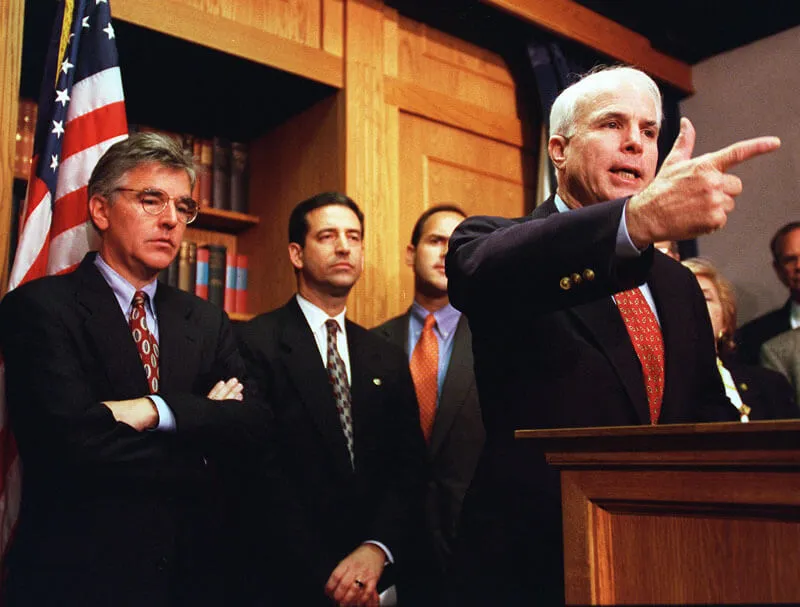
Despite the Federal Elections Campaign Act of 1974, which put limits on campaign contributions which eventually led to the rule that campaign donors could donate unlimited funds to political parties (but NOT the candidates themselves), both Republicans and Democrats pretty much ignored this rule.
The money donated was to be used to "build party activities," but the funds were ultimately still used to support individual candidates and the money became known as "soft money." Multiple attempts in Congress to limit the use of "soft money" have always been thwarted, which only exacerbated the campaign finance problem that McCain saw before him.
McCain Teamed Up With Democrat Russ Feingold

McCain enlisted the help of Russ Feingold, who was the Democratic Senator from Wisconsin at the time. Together they published an op-ed calling for campaign finance reform, in addition to drafting their own bill. Although the two Senators were as different as night and day, McCain saw independence in Feingold, similar to that which earned McCain the reputation as a "maverick."
Their takedown of campaign finance would not be easy since political incumbents in Washington take their campaigns so seriously, they need the "soft money" funds to circumvent the regulations that were already set in place.
McCain Defended His Actions With Public And Media Support

Although Washington did not back what was then known as the McCain-Feingold Act, the two Senators found an unlikely ally in the media, making them renegades political policy reform in Washington. Still, many Republicans questioned McCain's motives, to which he replied in Worth the Fighting For:
"Those who criticize my reform efforts as posturing for what they disparage as the liberal East Coast media misunderstand the relationship. There is little institutional interest in reforming entrenched traditions, traditions under which most politicians have prospered handsomely. Only public opinion can force change, and the only way to arouse public opinion is through the media."
McCain Still Received Contributions Despite His Cause

Of course, despite the good intentions behind the McCain-Feingold Act, the Arizona Senator was still criticized, especially as he began to prepare for his first run in the 2000 presidential race. In the late '90s, McCain was a Senate Commerce Committee Chairman and incidentally received campaign contributions from private business interests that he was externally involved in.
Members of Congress were quick to note the irony of McCain's position in addition to his support for campaign reform. But McCain, who at this point had garnered support from the public for reform, was prepared to defend himself against detractors.
McCain Declares That The Problem Is Corrupting Washington

In 1999, McCain appeared on NBC's Meet the Press, where he addressed concerns about his position as the Commerce Committee Chairman: "Literally every business in America falls under the Commerce Committee, and that's why the name of it is 'Commerce' ...and I'm very pleased that I get support from many corporations and companies around America. And I restrict those contributions to $1,000."
McCain went on to explain that it wasn't the thousand-dollar donations corrupting Washington, but in fact, "It's the huge, uncontrolled, now multi-billion dollars in campaign contributions." With that, McCain trudged on with his reform promises to the public.
McCain And Feingold Get Recognized For Their Perseverance

With his signature perseverance, McCain and Feingold were able to successfully pass the Act. With some provisions, it became known as the Bipartisan Campaign Reform Act of 2002 and went into effect the following year. In addition to regulating and restricting the use of soft money, the new law also prevents foreign corporations and foreign nationals from making contributions to issue advocacy advertisements used by political candidates.
Although they were hotly criticized while trying to get the bill passed, McCain and Feingold were honored with the John F. Kennedy Profile in Courage award in 1999.
McCain's First Shot At Presidency Was In 1999

In case you missed it, John McCain's 2008 presidential campaign wasn't his first. We mentioned earlier that he decided to run for the presidency in 1999, but the campaign road was not an easy one to navigate for the Arizona Senator, come to find out.
In his book Worth the Fighting For, McCain writes, "I didn't decide to run for president to start a national crusade for the political reforms I believed in or to run a campaign as if it were some grand act of patriotism. In truth, I wanted to be president because it had become my ambition to become president. I was sixty-two years old when I made the decision, and I thought it was my one shot at the prize."
The Kosovo War Required Attention First

McCain planned to formally announce his run with a four-day tour that was to begin at his alma mater, the Naval Academy in Annapolis, Maryland. However, his first roadblock came before he even made the announcement. At the time, the Kosovo War was going on in Eastern Europe and the Clinton Administration suggested NATO intervention against the Federal Republic of Yugoslavia, who were reportedly persecuting the ethnic Albanian population in the country.
McCain voted in favor of the proposal saying, "We must not permit the genocide that Milosevic has in mind for Kosovo to continue. We are at a critical hour."
McCain Was In It To Win It

McCain's decision to postpone is road tour was praised by many people in the media and in Washington. However, McCain was probably someone who didn't need the praise, as his past experiences have given him a particular viewpoint in regard to foreign policies. He reportedly took an "in it to win it" stance towards the matter, especially after the capture of three American soldiers in Yugoslavia.
CNN correspondent Mark Shield said, "In thirty-five years in Washington, I have never seen a debate dominated by an individual in the minority party as I've seen this one dominated by John McCain."
McCain Makes His Formal Announcement

The conflict in Kosovo ended by June 1999, which cleared up the pathway for John McCain's political pursuits to move forward. On September 27, 1999, he appeared at the Naval Academy to make the formal announcement saying, "It is because I owe America more than she has ever owed me that I am a candidate for president to the United States."
He continued, "When our government has been taken from us by the special interests, the big-dollar donors, pride is lost to shame. When our politics is corrupted by money and lies, trust is lost to cynicism."
McCain Blamed Washington's Habits
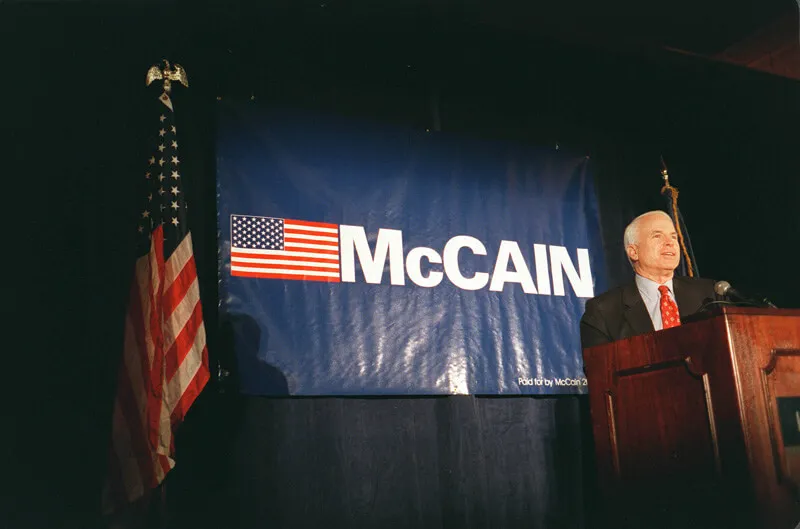
In addition to campaign finance, McCain proposed policy reforms in regards to taxes, Social Security, and education. He went on to say, "Restoring honesty to our political systems is the gateway through which all other policy reforms must pass... If elected president, I will not allow your Social Security money to be used for any purpose except Social Security, no ifs, ands or excuses. I will cut taxes, not for the special interests and the big-dollar donors, but for the working men and women of this country."
McCain also put emphasis on the idea that Washington's spending habits and priorities were not where they should be.
He Didn't Have The Support He Needed
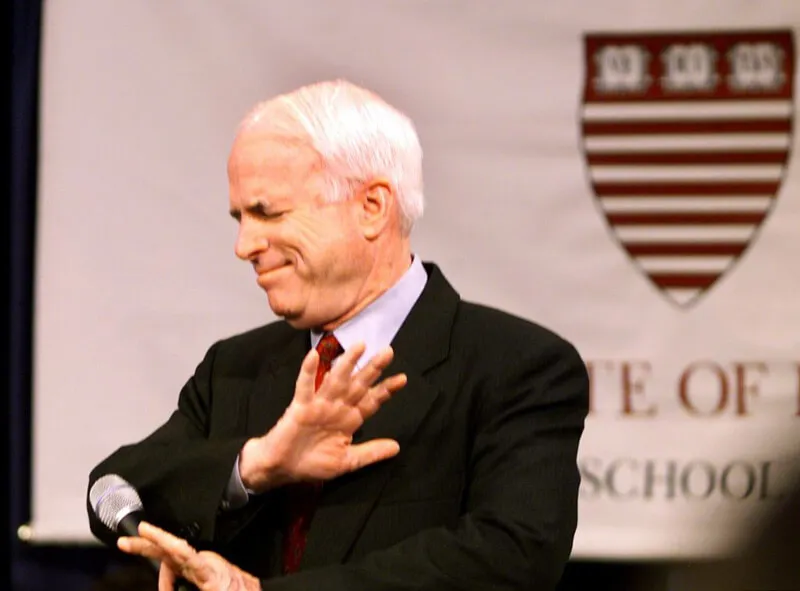
When McCain's campaign for president was underway, he did not have the support that he needed, especially since he was an underdog Republican candidate at the time. He didn't even have the support of Arizona's then-governor Jane Dee Hull, who went against what is customary by endorsing then-Governor George W. Bush of Texas for the Republican spot on the ballot.
This was unusual because usually, governors would support the candidate that hails from their home state. But political historians will tell you that Governor Hull had her reasons for endorsing Bush, as she held some ambivalence toward McCain.
Arizona's Then-Governor Didn't Back McCain

Apparently, McCain and Governor Hull had a contentious relationship as he has reportedly been dismissive or too "heavy-handed" in his dealings with her. She claimed to The New York Times in 1999 that Senator McCain was "not particularly warm" and that he had a "flaring temper and sometimes prickly personality."
She even claimed that McCain would erupt at her over the phone, mimicking to reporter Richard Berke a phone call saying, "You've got to hold it out there for a while, and let him calm down. We all have our faults, and it's something that John has to keep control of."
Bush Humiliated McCain In Arizona

John McCain's lack of support from his own state was fodder for many political pundits at the time. As soon as he announced his run, then-Governor George W. Bush arrived at the Arizona primaries and rubbed it in McCain's face saying, "I've got advice for anyone who's running for president. Make sure you get the governor on your side, particularly if you've got a governor with a record of accomplishment and a governor as beloved by the people as Governor Hull."
Bush had nine percentage points over McCain in the polls and things were not looking positive for McCain's campaign.
McCain Tried To Prove Everyone Wrong
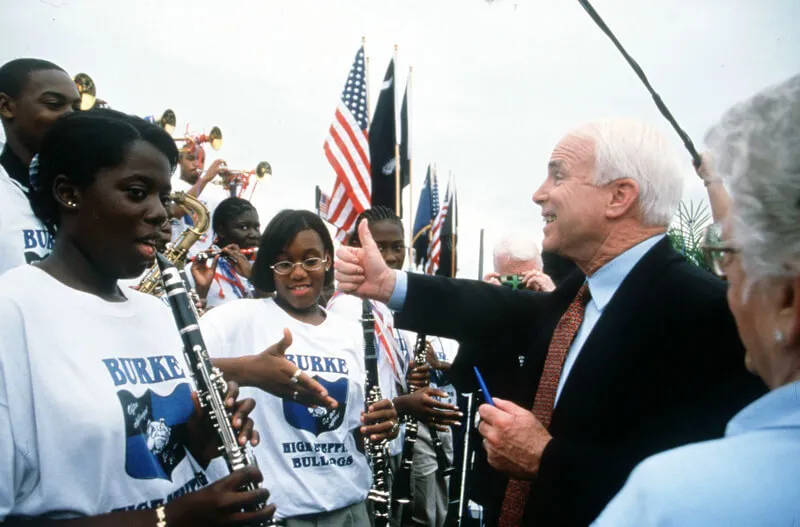
Because of Governor Hull's claims that McCain had a bad temperament, the media and other political figures in Washington took the statement to new heights, going so far as to claim that McCain was mentally unstable especially as a result of his time as a Prisoner of War in Vietnam.
McCain's campaign released 1,500 pages of medical and psychiatric records to the public, with a statement that said, "Senator McCain has never been diagnosed with or treated at the center for a psychological or psychiatric disorder. He has been subject to an extensive battery of psychological tests and following his last examination in 1993, we judged him to be in good physical and mental health."
A Life To Remember
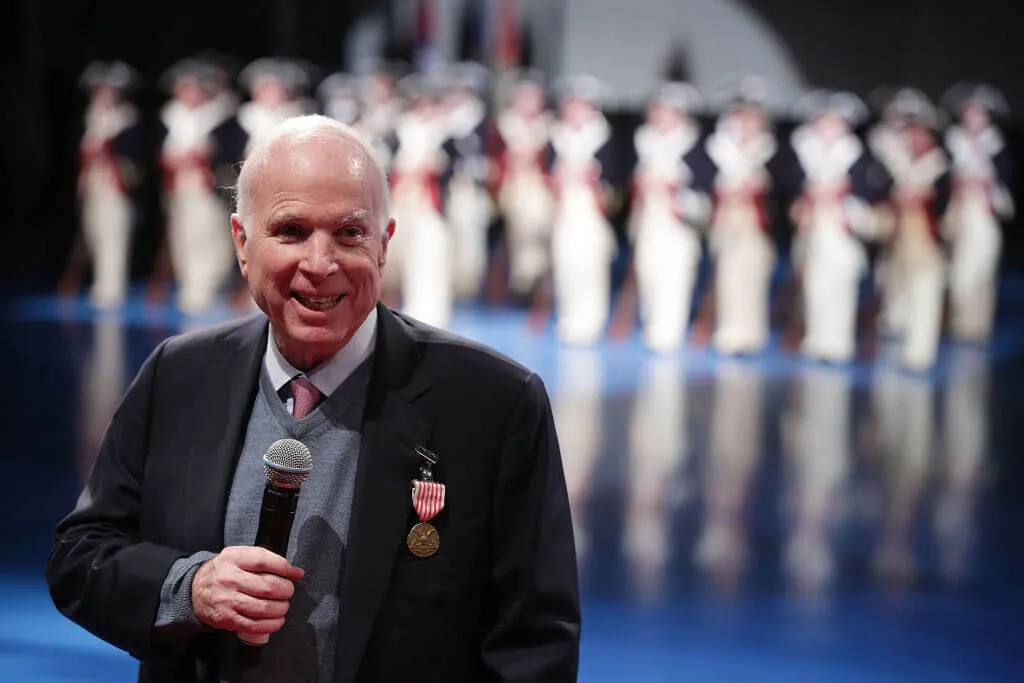
On August 25, 2018, Senator McCain died at the age of 81. The sad news, shared by his family, arrived just days after it was revealed that he decided to stop treatment for brain cancer. Cindy McCain, his longtime wife wrote and biggest supporter wrote:
"My heart is broken. I am so lucky to have lived the adventure of loving this incredible man for 38 years. He passed the way he lived, on his own terms, surrounded by the people he loved, in the place he loved best."










